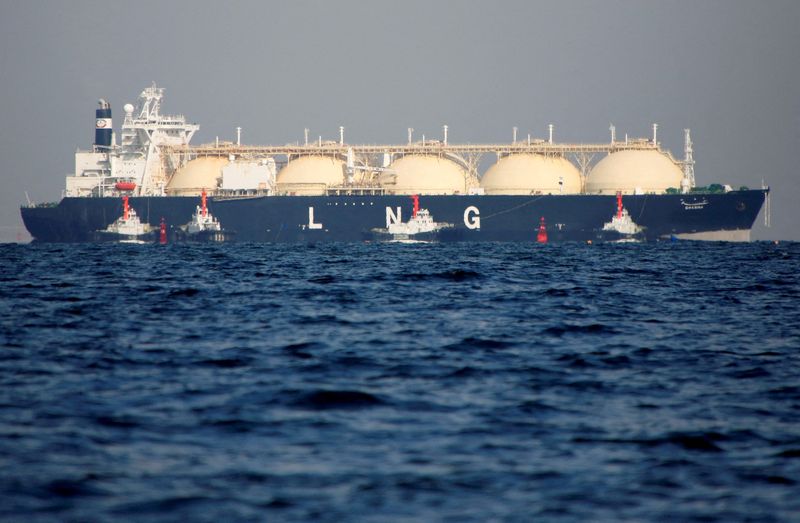By Clyde Russell
LAUNCESTON, Australia (Reuters) -Asia's imports of liquefied natural gas (LNG) fell in April as major buyers China and Japan trimmed purchases, offsetting small gains among South Asian countries.
The total volume of the super-chilled fuel imported was 20.86 million tonnes in April, down from March's 22.23 million and 22.19 million in February, according to data compiled by commodity analysts Kpler.
At the same time that volumes were slipping in Asia, Europe was buying more LNG, with imports rising for a third straight month in April, reaching 12.50 million tonnes, the most since December.
Europe's LNG demand has shifted structurally higher as pipeline supplies from Russia were curtailed in the wake of Moscow's invasion of Ukraine in February last year.
However, the healthy state of European gas inventories does raise the possibility that LNG imports will steady or drop somewhat in coming months as utilities pare purchases for stock-building.
Conversely, Asia's LNG purchases may increase as price-sensitive buyers such as India and Pakistan ramp up imports amid a declining spot price.
The price of spot LNG for delivery to north Asia dropped to $11.05 per million British thermal units (mmBtu) in the week to April 28, the lowest since June 2021.
The spot price has now slid 71% since its northern winter peak of $38 per mmBtu in mid-December, and is down 84% from its record high of $70.50, reached in late August as European utilities scrambled to source enough gas to cover the winter demand peak.
Even though the spot price has dropped considerably from its peaks, it's worth noting that it is at the upper end of the $1.80 to $11.60 per mmBtu range that persisted from the start of 2015 to December 2020.
This means that while the price is now low enough to tempt buyers that had withdrawn from the market during last year's surge, it's still at a level that wouldn't be considered a bargain.
Nonetheless, Indian utilities are coming back into the market, with Kpler estimating April imports of 1.98 million tonnes, up from 1.84 million in March and the most since May last year.
Pakistan imported 650,000 tonnes in April, up from 570,000 in March and the highest monthly total since the 660,000 in January.
Imports by Bangladesh were assessed at 490,000 tonnes in April, up from 450,000 in March, with these past two months being the strongest since June 2022.
JAPAN, CHINA DIP
The higher demand from South Asia wasn't enough to offset declining purchases by Japan, which last year reclaimed its title as the world's biggest LNG buyer from China.
Japan's April imports were assessed at 5.16 million tonnes, down from 5.57 million in March, and the weakest month since October last year.
However, it's worth noting that Japan's LNG imports typically follow a seasonal pattern, rising for winter and summer and tailing off in the shoulder seasons between these demand peaks.
China's LNG imports have yet to show any meaningful recovery, despite signs of stronger energy demand in the world's second largest economy.
April imports were 5.23 million tonnes, down from March's 5.48 million, but up from 4.99 million in February.
It's also worth noting that China's April performance was an increase from the April last year, when 4.61 million tonnes were imported.
The lower spot price may well encourage higher imports of LNG by China, although in the past volumes have only picked up significantly when the spot price dips below $10 per mmBtu, as this allows LNG to be competitive in China's domestic markets.

Similar to China, it will probably take even lower spot prices to meaningfully boost imports by India and other South Asian nations.
The opinions expressed here are those of the author, a columnist for Reuters.